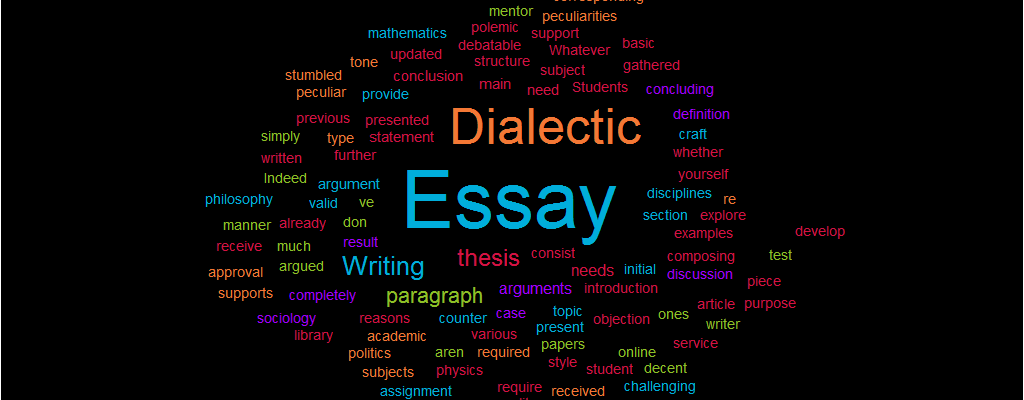How To Write An Outstanding Dialectic Essay
Publication Date:

A dialectic essay is a peculiar type of academic writing. Students of many disciplines aren’t required to write such paper simply because a dialectic essay is written in a polemic style. Indeed, not much can be argued upon in mathematics or physics while such disciplines as philosophy, sociology or politics do require a student to explore various subjects in a dialectic manner.
If you received such assignment as composing a dialectic essay and you’re not sure how to do it, you can find examples of good papers online or at the library and try writing an essay yourself. In case you don’t know whether the examples that you stumbled upon are quality ones, you can use professional essay writing service so that an expert writer could craft a paper for you and you could learn how it has to be done.
This article will show the basic peculiarities of composing such challenging paper as a dialectic essay so that you could craft a decent piece of writing and receive approval from your mentor.
A dialectic essay definition
A dialectic essay is a type of paper where you need to make a thesis and provide arguments and counter-arguments to test the main point and come up with a corresponding conclusion, usually the one, which supports the main thesis.
The purpose of a dialectic essay
The main idea behind writing a dialectic essay is to develop analytical skills in students and check how they can synthesize the information. When the subject is presented from different sides, it is important to find verity in both positive and negative aspects and come up with your own conclusion based on your exploration of the issue.
The structure of a dialectic essay
A traditional five-paragraph structure is the most suited for a dialectic essay. That is, the text should consist of an introduction, a three-paragraph body and a concluding section.
- Introduction
This part needs to be short and concise with a definition of the essay topic and the introduction of the thesis statement. Don’t give away too many details of a further discussion but try to catch reader’s attention so that he wants to read further and is eager to reveal the conclusion that you will come up with at the end of your essay.
- The body of an essay
Obviously, this part of the paper is the largest and it typically may consist of three paragraphs. Now you get a chance to elaborate on the subject and present all arguments that you gathered as a result of your research.
In the first paragraph, you need to state your argument and provide the reasons and pieces of evidence, which you gathered while researching various media such as articles, videos, websites, and so on. Whatever valid facts for the support of the thesis you’ve found, present them in this paragraph.
The second section needs to be dedicated to the counter-argument. The objection should refer to the point of view presented in the previous paragraph and not to the main thesis that needs to be viewed only as debatable.
The third paragraph is aimed at expressing your response to the objection in the previous paragraph. Be careful not to repeat yourself with the arguments, which you’ve already listed in the first body paragraph. What you need to do is to criticize the counter-argument of the second section.
- Conclusion
In the concluding paragraph, you can either restate your initial thesis statement or present an updated thesis.
In the first case, you will be able to reiterate the initial idea with more certainty since you’ve already proven in the above analysis that the thesis in question is now verified.
In the second case, you can provide a new thesis, which should not be completely contradictory to your initial statement. It needs to be slightly updated as a result of the discussion presented in the essay.
Tips to consider when writing a dialectic essay
- The topic of your essay should be debatable enough for you to come up with a valid argument and a similarly viable objection.
- Keep in mind your audience and use the correct tone. The nature of a dialectic essay implies controversy so your tone needs to be persuasive and objective but never aggressive, offensive or condescending no matter whether you agree with one of the arguments or are completely against it.
- Whatever reasons you give, they need to be factual and clear. Steer away from presenting any dubious and subjective claims so that you could avoid any misunderstandings between those who support the thesis statement and those who object it.